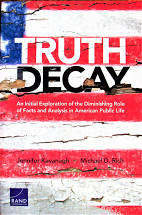
At the end of the first installment of this article, we had established that trust of the media is very low. The question of whether journalism has been abandoned by journalists deserves greater examination without prejudice. That’s where we begin.
Truth Decay
The first stop on my journey into the state of journalism is The RAND Corporation. On their website, we read who they are. “The RAND Corporation is a research organization that develops solutions to public policy challenges to help make communities throughout the world safer and more secure, healthier and more prosperous. RAND is nonprofit, nonpartisan, and committed to the public interest.”
In 2018, RAND published a book by Jennifer Kavanagh and Michael D. Rich titled TRUTH DECAY: An Initial Exploration of the Diminishing Role of Facts and Analysis in American Public Life. The authors define truth decay as “a set of four interrelated trends: an increasing disagreement about facts and analytical interpretations of facts and data; a blurring of the line between opinion and fact; an increase in the relative volume, and resulting influence, of opinion and personal experience over fact; and lowered trust in formerly respected sources of factual information. These trends have many causes, but this report focuses on four: characteristics of human cognitive processing, such as cognitive bias; changes in the information system, including social media and the 24-hour news cycle; competing demands on the education system that diminish time spent on media literacy and critical thinking; and polarization, both political and demographic. The most damaging consequences of Truth Decay include the erosion of civil discourse, political paralysis, alienation and disengagement of individuals from political and civic institutions, and uncertainty over national policy.”

When CNN was launched in 1980, it became the first all-news network and the first 24-hour news network on television. While there is always something happening on our planet, it doesn’t necessarily qualify as news. Ratings are important to any television network and such things as scientific breakthroughs, new inventions or personal accomplishments usually don’t make the grade. Repeating what are deemed as major stories, which often have to do with war and all manner of violence or conflict of some kind, needs to occur so we are all aware of the events that could ruin our sense of peace and security. Okay, I’m letting my cynicism filter through here, but no one can deny that bad news trumps good news in the news universe. So, the big stories are repeated.
Somewhere along the timeline, CNN executives must have realized it would be interesting to have newscasters, contributors and guests editorialize about the news. Enter opinionated broadcasts. Of course, this wasn’t new. There had been op-ed pieces as part of the newspaper business for a long time. Radio was doing talk shows with political argument since at least the 1940s. Commentators on TV had been analyzing the news since Meet the Press back in 1947. Only thing is, there is a big difference in the discourse of those shows and what we see on cable news networks now. Kavanagh writes, ““Journalism in the U.S. has become more subjective and consists less of the detailed event- or context-based reporting that used to characterize news coverage.”
This phenomena has become so pronounced now that some news outlets are clearly compromised in their presentation of current events. Our recent election coverage is an excellent example. Trump boasts months beforehand that the only way he can lose is if the election is “rigged.” He then took actions that could hamstring the U.S. Postal Service when it comes to mail-in ballots. He demanded the vote count be stopped in certain places and made claims of voter fraud. To date, none of the lawsuits he has had filed have found any traction in the courts. They’re finding no factual basis for these claims. The media responded along partisan lines, with the mainstream outlets calling his claims false and baseless from the outset and the conservative commentators jumping on the Trump bandwagon without waiting to see if there is any credible evidence of irregularities in our traditionally stable and secure election proceedings.
With constant bombardment of information from television, radio, the internet and social media, we find it more difficult to discern what is true. Journalists, whether concentrating on just the facts or offering stories based on something less than factual, have a tough sell to a tough crowd. Paul Simon’s lyric from The Boxer, “Still a man hears what he wants to hear and disregards the rest” is ringing true.
Murky Waters
We’re swimming in a sea of doubt amid sharks with opinions for teeth. It must be frustrating for old school journalists who doggedly pursue their work with integrity and high purpose. Is it still the norm that a journalist confirms a story with a second source instead of publishing or broadcasting on the word of just one? With all the competition for breaking news and headline-worthy content, there must be tremendous pressure on journalists to produce.
In our final installment on whether journalism has been abandoned, we’ll search for the source of this allegation and explore the depth of its validity.
